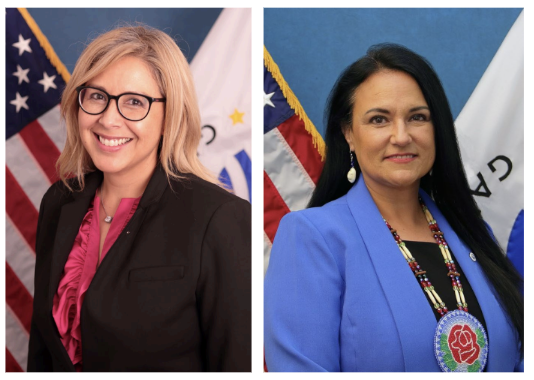
- Details
- By Native News Online Staff
Secretary of the Interior Deb Haaland (Laguna Pueblo) on Monday announced the proposed appointments of Sharon Avery and Jeannie Hovland as Associate Commissioners to the National Indian Gaming Commission.
Established in 1988, the Indian Gaming Regulatory Act established the three-person National Indian Gaming Commission to support and promote tribal economic development, self-sufficiency, and strong tribal governments through the operation of gaming on Indian lands. The Commission’s Chair is appointed by the President and its two Associate Commissioners are appointed by the Secretary of the Interior. All Commission members serve three-year terms.
"Not only does gaming support Tribal economies, but the funding it generates also helps to support the vital services that Tribal Nations provide to their citizens — from language preservation to healthcare,' Secretary Deb Haaland said. "Today’s appointments to the National Indian Gaming Commission will help ensure we continue to provide resources and support for an industry that remains one of the most significant sources of economic development in Indian Country."
Sharon Avery, enrolled tri bal citizen of the Saginaw Chippewa Tribe of Michigan, currently serves as an Associate General Counsel for the National Indian Gaming Commission’s Office of General Counsel. In this role she has gained familiarity with the agency’s structure and the important role the agency plays within the tribal gaming industry. Prior to joining the National Indian Gaming Commission, Ms. Avery worked in the Legal Department of her tribe for 10 years. She graduated from Michigan State University College of Law with a Juris Doctor degree and a certificate from the Indigenous Law and Policy Center.
Jeannie Hovland is an enrolled tribal citizen of the Flandreau Santee Sioux Tribe of South Dakota and currently serves as Vice Chair of the National Indian Gaming Commission. Since joining the Commission, she has worked collaboratively to consult with Tribes for the promulgation of regulations and to coordinate the agency's regulatory responsibilities with Tribal regulatory authorities. Prior to joining the Commission, Ms. Hovland served as Commissioner of the Administration for Native Americans and Deputy Assistant Secretary for Native American Affairs at the Department of Health and Human Services and held roles at the Interior Department as well as in the office of South Dakota Senator John Thune.
Appointments to the Commission can be finalized following a required 30-day public comment period. Information on how to comment and full biographies of the appointees can be found in the accompanying Federal Register notice.
More Stories Like This
Native News Weekly (August 25, 2024): D.C. BriefsUS Presidents in Their Own Words Concerning American Indians
Native News Weekly (January 18, 2026): D.C. Briefs
Federal Judge Orders ICE to Halt Use of Pepper Spray, Arrests of Peaceful Protesters in Twin Cities
Tunica-Biloxi Cultural Leader John D. Barbry Walks On
Help us defend tribal sovereignty.
At Native News Online, our mission is rooted in telling the stories that strengthen sovereignty and uplift Indigenous voices — not just at year’s end, but every single day.
Because of your generosity last year, we were able to keep our reporters on the ground in tribal communities, at national gatherings and in the halls of Congress — covering the issues that matter most to Indian Country: sovereignty, culture, education, health and economic opportunity.
That support sustained us through a tough year in 2025. Now, as we look to the year ahead, we need your help right now to ensure warrior journalism remains strong — reporting that defends tribal sovereignty, amplifies Native truth, and holds power accountable.
 The stakes couldn't be higher. Your support keeps Native voices heard, Native stories told and Native sovereignty defended.
The stakes couldn't be higher. Your support keeps Native voices heard, Native stories told and Native sovereignty defended.
Stand with Warrior Journalism today.
Levi Rickert (Potawatomi), Editor & Publisher


